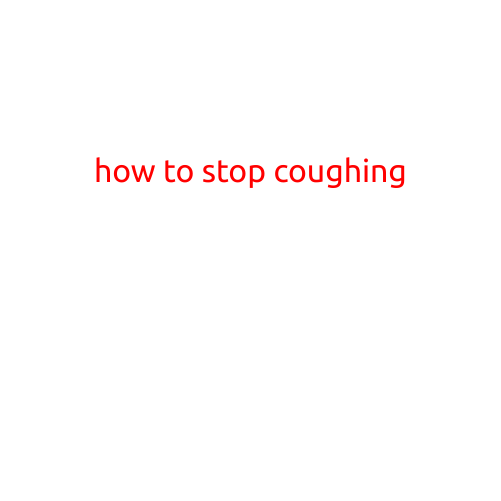
How to Stop Coughing: Effective Remedies and Tips
Are you tired of feeling like your cough won’t quit? Whether you’re dealing with a common cold, allergies, or a more serious condition like bronchitis, a persistent cough can be frustrating and disrupt your daily life. But don’t worry, there are many effective ways to stop coughing and find relief from its annoying symptoms.
Underlying Causes of Coughing
Before we dive into the remedies, it’s essential to understand what’s causing your cough. Some common underlying causes include:
- Respiratory infections, such as colds, flu, or bronchitis
- Allergies, like hay fever or dust mites
- Sinus infections or pressure
- Pneumonia or other lung infections
- Acid reflux or GERD (gastroesophageal reflux disease)
- Medications, such as ACE inhibitors or antibiotics
Home Remedies to Stop Coughing
Here are some simple and effective home remedies to help you stop coughing:
- Stay Hydrated: Drinking plenty of fluids, such as water, herbal tea, or warm soup, can help thin out mucus and ease your cough.
- Rest: Get plenty of rest to help your body recover from the underlying cause of your cough.
- Use a Humidifier: Dry air can irritate your throat and make coughing worse. A humidifier can add moisture to the air and help soothe a dry, scratchy throat.
- Try Honey: Honey has natural antibacterial and anti-inflammatory properties that can help soothe a sore throat and reduce coughing. You can mix it with warm water or tea to create a soothing drink.
- Use a Sore Throat Spray: Over-the-counter sore throat sprays, such as chloraseptic or benzocaine, can help numb the throat and reduce coughing.
- Try Cough Drops: Cough drops can provide temporary relief by coating the throat and providing a soothing sensation. Look for drops containing ingredients like menthol, eucalyptus, or honey.
- Avoid Irritants: Stay away from irritants like smoke, dust, or strong odors that can aggravate your cough.
Other Remedies to Stop Coughing
If your cough persists or is severe, you may want to try these additional remedies:
- Expectorants: Over-the-counter expectorants like guaifenesin (Mucinex) or dextromethorphan (Robitussin) can help loosen mucus and make it easier to cough up.
- Throat Lozenges: Lozenges containing ingredients like menthol, eucalyptus, or honey can help soothe a sore throat and reduce coughing.
- Steam Inhalation: Inhaling steam from a bowl of hot water or a steam inhaler can help loosen mucus and reduce coughing. You can add eucalyptus oil or menthol to the water for added benefits.
- Antihistamines: If your cough is caused by allergies, antihistamines like diphenhydramine (Benadryl) or loratadine (Claritin) may help relieve symptoms.
- Steroids: If your cough is caused by inflammation, steroids like prednisone may be prescribed to reduce swelling and relieve symptoms.
When to See a Doctor
If your cough persists or worsens over time, it’s essential to see a doctor to determine the underlying cause and receive appropriate treatment. You should seek medical attention if you experience:
- Difficulty breathing or shortness of breath
- Chest pain or tightness
- Fever over 102°F (39°C)
- Thick, yellow or green mucus
- Coughing up blood or yellow or green phlegm
- A persistent cough that lasts more than a week
Conclusion
In conclusion, a persistent cough can be frustrating and disrupt your daily life. By understanding its underlying causes and using effective home remedies and other treatments, you can find relief from its annoying symptoms. If your cough persists or worsens, it’s essential to seek medical attention to determine the underlying cause and receive appropriate treatment.





